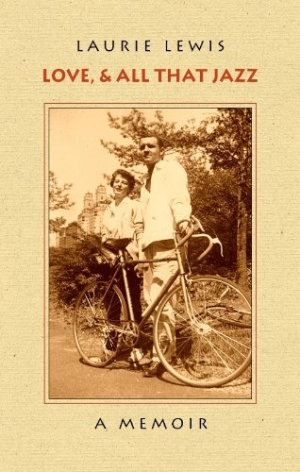Love, and all that jazz
Amid the chaos of drugs and jazz, Lewis finds insight into the way we recall the past.
“How hard to write about this, to sort out the memories. To make decisions about how much honesty, where, and when. I see things now so differently. And all I can say is the truth as it will come into my memory.” This passage from Laurie Lewis’s new book, Love, and All That Jazz, explains the core difficulty of writing a memoir: the mind is selective and subjective with memory, and those attributes change with life experience. Whether the memoirist has made peace with the past or not, there must be clarity in the narrative as to what she wishes to convey to the reader. Lewis’s first memoir, Little Comrades, achieved this beautifully. Love, and All That Jazz, her follow-up, mines her years in New York City, through two marriages, co-dependency, becoming a mother, separation, her career in publishing, and her eventual move back to Canada.
As in the first memoir, Lewis, amid a chaotic atmosphere filled with interesting characters and intellectual stimulation, remains ambitious and enterprising, if a bit impulsive. After falling in love with her friend’s husband, Gary, who lives above her and her husband in an apartment building, she and Gary divorce their spouses and move into an apartment together. Gary is tall, good-looking, and has a good job as a Pepsi-Cola advertising executive. But his real love is jazz, and they spend their nights listening to music, going to jazz clubs, and hanging out with other musicians. They spend time with Miles Davis, Lenny Bruce, Thelonious Monk, and others, all whom Gary seems to know well. While they are living this charmed bohemian life, they have a daughter, Amanda, and Gary slips into alcoholism and amphetamine addiction and forays into heroin. Much of the memoir focuses on Gary’s addictions throughout their tumultuous marriage.
Lewis chooses to insert excerpts from Gary’s letters and his own recollections of certain events. Although an interesting device that does provide contrast, Gary’s voice is uneven, at times drug fueled and incomprehensible, which disrupts Lewis’s fluidity. Lewis’s perspective on these events in her life seems unresolved, which weakens the perspective and the narrative. Even though Gary and Lewis separate for nearly two decades, there is not much focus on Lewis’s concern for Amanda’s well-being or much personal reflection on what motivates her to stay married to Gary. This ambivalence makes it difficult for the reader to empathize with her journey toward freedom.
Memoirs are versions of our own truths, but we must be sure of what we believe our own truths to be. When Lewis recounts her personal dramas, she shows us that time does not always give us clarity and resolution. But Lewis is a person who has lived a fascinating life, and it’s enjoyable to read her accounts of her relationships with famous musicians and the inhabitants of the publishing world.
Reviewed by
Monica Carter
Disclosure: This article is not an endorsement, but a review. The publisher of this book provided free copies of the book and paid a small fee to have their book reviewed by a professional reviewer. Foreword Reviews and Clarion Reviews make no guarantee that the publisher will receive a positive review. Foreword Magazine, Inc. is disclosing this in accordance with the Federal Trade Commission’s 16 CFR, Part 255.

